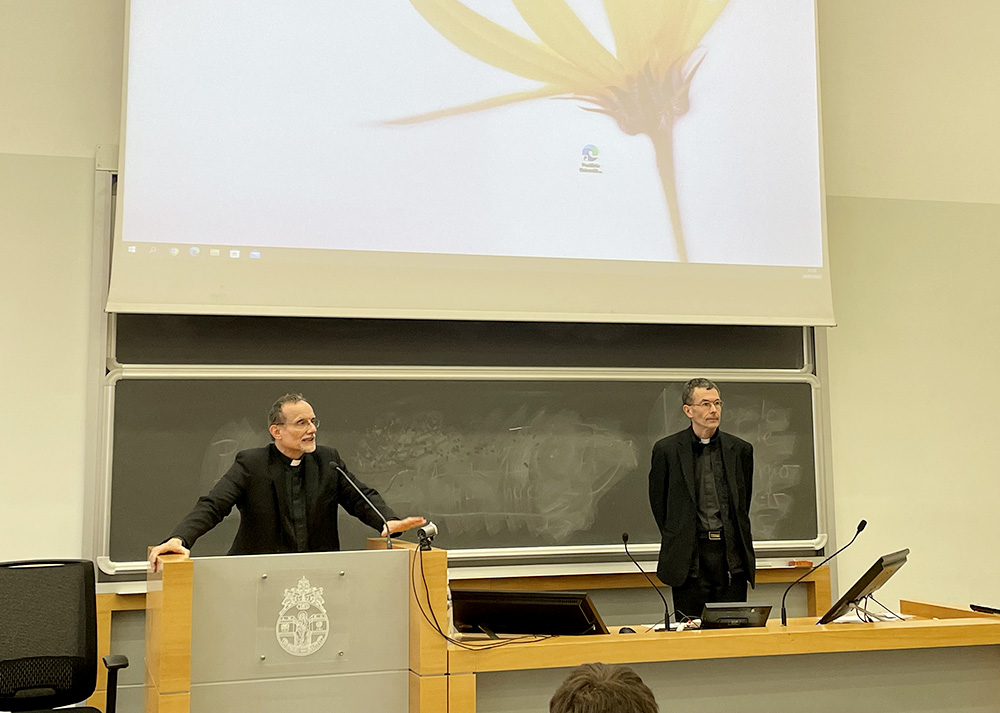
German Jesuit Fr. Philip Renczes, left, presents next year's seminar offerings for the newly launched ecumenical studies program at the Pontifical Gregorian University in Rome. (NCR photo/Christopher White)
When Pope Francis, the archbishop of Canterbury and the moderator of the Church of Scotland made their historic February visit to South Sudan — an effort to illustrate that by putting aside their own differences to beg for peace, that the leaders of South Sudan could put aside their own tribal disputes to work for it — they opened a new chapter in ecumenical relations.
And now, in Rome, a new generation of future leaders is embarking on a different kind of ecumenical journey in the academic world through a novel new program at one of the Eternal City's most prestigious institutions.
During a recent lunch break at Rome's Pontifical Gregorian University in late March, just over 20 students gathered in a classroom to hear German Jesuit Fr. Philipp Renczes present the lineup for next year's courses in the newly launched program in "Comparative Theology of Christian Traditions and Ecumenical Studies."
Renczes, who is the dean of theology at the Gregorian, told me that the program is a response to "reading the signs of the times" and to the new "ecumenical spring" that has blossomed under the Francis pontificate.
Further, he said, "interdisciplinary research and teaching has become paramount in the academy today," which he said is a natural fit for an ecumenical program seeking to bring together leading academics and luminaries from a range of traditions.
The two-year program, which was launched during the 2022-23 academic year, is not a traditional course in which students listen to one professor lecture throughout the term. Instead, each seminar is co-taught by both a Catholic professor and another professor from a different Christian tradition.
And the lineup for the year ahead is impressive, bringing together some of the top names in Christendom today, among them the former Archbishop of Canterbury Rowan Williams, Anglican Bishop Steven Croft, Orthodox theologian Tamara Grdzelidze, Franciscan Sister of Christian Charity Marie Kolbe Zamora and British theologian Jeremy Morris, to name only a few.
While the program for the current academic year has focused on the Orthodox Church, next year's offerings will focus on the worlds of Anglicanism and other Protestant churches.
Advertisement
This year's selection of the Orthodox Church, which has experienced a real crisis since the start of the war in Ukraine, has proven providential and a real laboratory for the importance of dialogue, given that the current cohort includes both a Russian student and a Ukrainian one.
While there has been no shortage of disagreements, Renczes believes that despite some testing, this type of encounter ultimately strengthens ecumenical relations, both personally and scholastically.
At the moment, a total of 10 students — also hailing from Germany, Italy, Nigeria and South Korea — are enrolled in the program, which grants Catholics students a Licentiate in Sacred Theology (STL) or a corresponding master's degree (or whatever equivalent is necessary) for students from other traditions.
The 59-year-old Renczes — who is both an accomplished scholar and an enterprising and entrepreneurial academic helping to rethink the future of higher education in the church — said the program takes inspiration from the Gregorian's licentiate in Judaic studies and Jewish-Christian relations, which he also started. It uses the same model of co-taught seminars, which he said is key to both programs.
"This is an opportunity to actively learn from the other and to find a way of trust so you can even challenge the other," he said. "To tackle the dividing issues, you really need a level of trust."
This can't happen through just a semester exchange, said Renczes, the same way it does over the course of two years, which he said "gives students a chance to build a network of human relations."
But he said the program's aim is not just build surface-level human relationships, which he said runs the risk of being "self-referential," but to also do the heavy lifting that comes with academic scholarship, which he believes deepens the ecumenical encounter.
Historically, the Gregorian University — founded by St. Ignatius of Loyola in the 16th century — has produced a number of the Catholic Church's best known leaders (including 17 popes who have been alumni or faculty).
Renczes believes this new program, run by one of Catholicism's most storied institutions, will help trailblaze beyond its own tradition.
"There's a feeling that we're going through a period of transition, and not just in the Catholic Church," he told me. "We're trying to figure out what the church will look like in 10 or 20 years, and ecumenical relations become more and more relevant to this."




